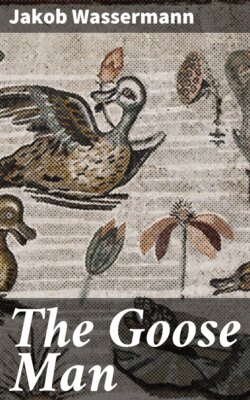Читать книгу The Goose Man - Jakob Wassermann - Страница 31
На сайте Литреса книга снята с продажи.
III
ОглавлениеTable of Contents
For nine long years, that is, from the time she was fifteen until she was twenty-four, his sister Marguerite kept house for him. She got his breakfast, made his bed, darned his socks, and brushed his clothes; and all he knew about her was that she had yellowish hair, a skin full of freckles, and a timid, child-like voice. His astonishment was consequently unbounded when Andreas Döderlein called one day and proposed to her. He had moved into the house the year before. Herr Carovius was amazed for the very simple reason that he had never known Marguerite except as a fourteen-year-old girl.
He took her to task. With unusual effort she summoned the courage to tell him that she was going to marry Döderlein. “You are a shameless prostitute,” he said, though he did not dare to show Andreas Döderlein the door. The wedding took place.
One evening he was sitting in the company of the young couple. Andreas Döderlein, being in an unusually happy mood, went to the piano, and began playing the shepherd’s motif from Wagner’s “Tristan and Isolde.”
Herr Carovius sprang to his feet as if stung by a viper, and exclaimed: “Stop playing that foul magic! You know as well as you are living that I don’t believe in it.”
“What do you mean, brother?” asked Andreas Döderlein, his head bowed in grief.
“What are you trying to do? Are you trying to teach me something about this poisoner of wells?” shouted Herr Carovius, and his face took on the enraged expression of a hunchback who has just been taunted about his deformity. “Does the professor imagine that he knows better than I do who this Richard Wagner is, this comedian, this Jew who goes about masked as the Germanic Messiah, this cacaphonist, this bungler, botcher, and bully, this court sycophant, this Pulchinello who pokes fun at the whole German Empire and the rest of Europe led about by the nose, this Richard Wagner? Very well, if you have anything to teach me about him, go on! Proceed! I am listening. Go on! Pluck up your courage.” With this he leaned back in his chair, and laughed a laughter punctuated with asthmatic sighs, his hands in the meantime resting folded across his stomach.
Andreas Döderlein rose to his full stature, see-sawed a bit on the tips of his toes, and looked down on Herr Carovius as one might look down upon a flea that one had caught and was just in the act of crushing between two finger nails. “Oh, ho,” he said, “how interesting! Upon my word, brother Carovius, you are an interesting individual. But if some one were to offer me all the money in the world, I should not like to be so … interesting. Not I. And you, Marguerite, would you like to be so interesting?”
There was something distinctly annihilating in this air of superiority. It had its full effect on Herr Carovius: his unleashed laughter was immediately converted into a gurgling titter. He opened his eyes wide and rolled them behind his nose-glasses, thus making himself look like a water-spitting figure on a civic fountain. Marguerite, however, timid as she was, never saying a word without making herself smaller by hiding her hands, glanced in helpless fashion from her brother to her husband, and dropped her head before them.
Was the feeling of Herr Carovius for Andreas Döderlein one of hatred? It was hatred and more. It was a feeling of venomous embitterment with which he thought of him, his name, his wife, his child, the thick, bulky wedding ring on his finger, and the gelatinous mass of flesh on his neck. From that evening on he never again visited his sister. If Marguerite got up enough courage to visit him, he treated her with crabbed contempt. She finally came to the point where she would pass his door with not a thought of entering it.
When the first child was born and the maid brought him the glad tidings, he squinted into the corner, tittered, and made bold to say: “Well, my congratulations. It is good that the Döderleins are not to become extinct, for so long as one of them is living, plaisir will not have vanished from the earth.”
Little Dorothea formed in time the habit of playing on the steps or around the old windlass well in the backyard. Herr Carovius procured forthwith a mean dog and named him Cæsar. Cæsar was tied to a chain, to be sure, but his snarls, his growls, his vicious teeth were hardly calculated to inspire the child with a love for the place near him. She soon stopped playing at home.
Four years had elapsed since the Carovius-Döderlein wedding. Herr Carovius was celebrating his birthday. Marguerite called with Dorothea. The child recited a poem which she had learned by heart for her uncle’s benefit. Carovius shook with laughter when he saw the girl dressed up like a doll and realised that the recital was imminent. Dorothea had of course the enunciation of one of her age. When through, Herr Carovius said: “Honestly, it would never have occurred to me that such a little toad could croak so beautifully.”
Though the man knew so little about women that it would be perilous to attempt to measure his ignorance of them, he nevertheless felt, as he looked into Marguerite’s radiant face, a certain disappointment in life—a disappointment which he would try at once to benumb but which delighted him.
